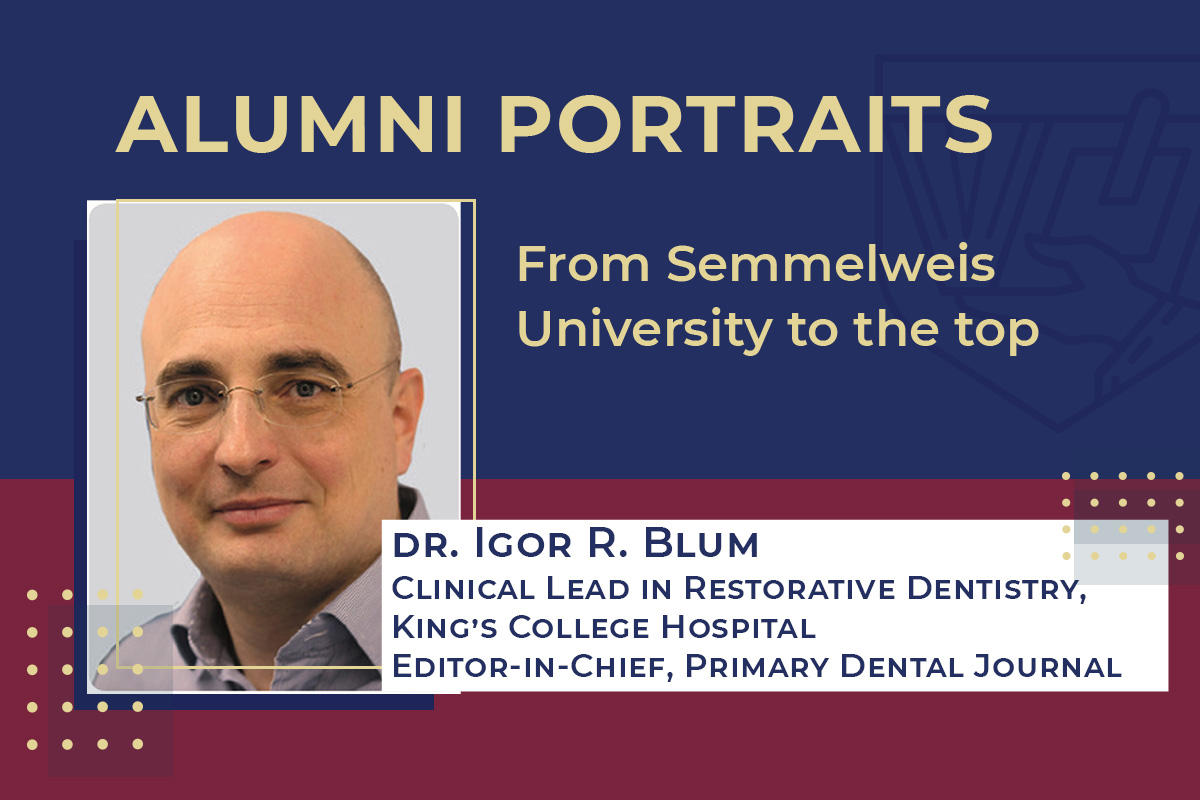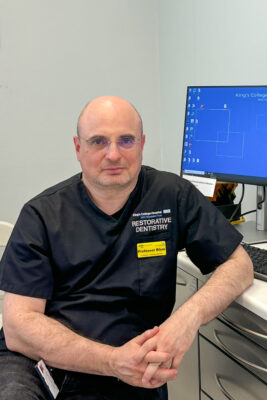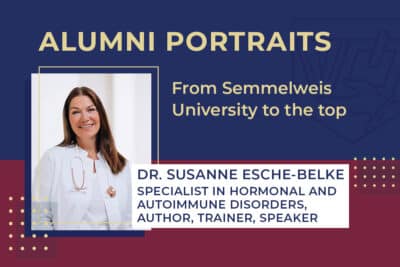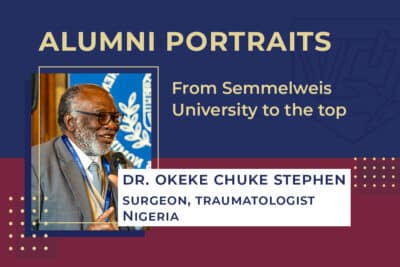Can you elaborate on how you developed your fascination with dentistry?
My initial interest in the medical sciences was instilled in me by my parents, who wanted me to become a doctor, like my grandfather. However, my interest in dentistry was sparked by my biology classes in secondary school, where, for the first time, I learned about the oral cavity, human dentition, and the structure of the tooth. I found this fascinating, and this was the first time I was thinking about studying dentistry. I was further drawn to pursuing dentistry as a career because I liked the idea of helping people improve their oral health and overall well-being, alongside enjoying working with my hands and seeing tangible results from my work.
How did your choice fall on Semmelweis University to start your dentistry studies at?
Semmelweis University had a good reputation for training doctors and dentists. Contrary to medicine, the options of studying dentistry in English in Hungary in the early 1990s were limited. As Semmelweis University was offering an international dentistry program in English, it became an obvious choice to me. Besides university, I was attracted to the vibrant life and rich culture that Budapest had to offer. In addition, the fact that my mother grew up in Budapest has provided me with a sense of connection to the city, which I am experiencing to this day.
 What did you bring with you from your time at Semmelweis dental school? What makes you feel connected to your alma mater?
What did you bring with you from your time at Semmelweis dental school? What makes you feel connected to your alma mater?
At Semmelweis University, it became quickly apparent that – in Benjamin Franklin’s words – failing to plan is planning to fail. To this effect, I learned that I had to be strategic to achieve my goals of graduating, both when it came to preparing for and performing at the examinations. This newly acquired skill became very useful when preparing for postgraduate examinations in the UK and elsewhere.
I have developed a strong bond with my alma mater because of the experiences and growth I went through during my time at Semmelweis University. It’s where I formed lasting friendships, discovered new passions, and navigated challenges that shaped who I have become. I also feel a sense of pride in being part of my alma mater, which helped me get to where I am in life.
What do you think is the most important mission of your career?
I think my career revolves around two key aspects: education and patient care. As a clinical professor in dentistry, I am shaping the next generation of dentists, so my role is to ensure that they have a strong foundation in technical skills, ethical practices, critical thinking, and compassionate patient care. Helping students understand the broader impact of dentistry on communities and individuals is crucial to me. But ultimately, it’s about creating dental professionals who are skilled, compassionate, and committed to improving oral health at a global level. Another mission is to stay involved in research and innovation in my area of dentistry (restorative dentistry and prosthodontics). Advancing the field through research, sharing new techniques, and integrating the latest technology and methods into the curriculum helps improve the standards of patient care and patient outcomes in the long run.
What do you consider the highlight of your career?
In my opinion, the highlights of my career are being promoted to chair and professor at an internationally renowned university with a dental school consistently ranked in the top 5 in the world, according to QS and Shanghai rankings, and the global recognition of my accomplishments in education and research through the bestowment of prestigious international awards from esteemed organizations, including the Association for Dental Education in Europe (ADEE), the International Association for Dental, Oral, and Craniofacial Research (IADR), and the Royal College of Surgeons in Ireland (RCSI).
You have quite a multifaceted and honorable working experience. You lead the Departments of Restorative Dentistry & Primary Dental Care at King’s College Hospital, you are the editor-in-chief of an international publication journal, you lecture worldwide, are engaged with undergraduate and postgraduate training, and spend time on academic research, to name but a few. What part of your work are you most passionate about and why?
Each of my roles comes with different responsibilities, duties, challenges, and expectations, and each role requires different skills. I like all my roles; however, it is the variety of the roles I am privileged to undertake that I am particularly passionate about, as each role provides a very different experience and fulfilment.
As you hold many visiting professorships in Europe and the USA, we would like to ask what it feels like to be a lecturer without borders.
Medicine and Dentistry are not limited by borders; therefore, lecturing on topics in my area of expertise without borders – whether as an educator traveling across countries or teaching in a virtual, international setting – can be an incredibly rewarding yet challenging experience. It combines the thrill of exploration, the joy of knowledge-sharing, and the hurdles of cultural adaptation. As a lecturer without borders, I enjoy not being tied to a single institution, country, or system. It allows me to teach anywhere in the world, whether physically or digitally, reaching and inspiring students and clinicians from diverse backgrounds, making a global impact, and creating a profound sense of purpose.
How did it feel when you received the Excellence in Dental Education Mature Career Award from the Association for Dental Education in Europe (ADEE)? What has contributed to this achievement?
I felt honored receiving this most prestigious recognition from ADEE because this award signifies and acknowledges a lifetime of dedication and contribution to dental education and my impact in the field. I felt a sense of achievement, validation for years of hard work in educational research, and appreciation from peers internationally in the field.
What helps you unwind when work becomes demanding? Do you have a hobby or a habit for tackling this?
For unwinding I enjoy mental and emotional relaxation techniques, reading, travelling, walking, watching movies, and diving into deep conversations. My hobbies include learning new things about the world, open sea diving, and reading books on philosophy, psychology, and emotional intelligence.
Do you have a piece of advice for those starting their studies in your field?
I recommend a quote by Confucius: “Our greatest glory is not never falling, but in rising every time we fall.”
Hanna Szekeres, Alumni Directorate
Image credit: Igor R. Blum, cgdent.uk




